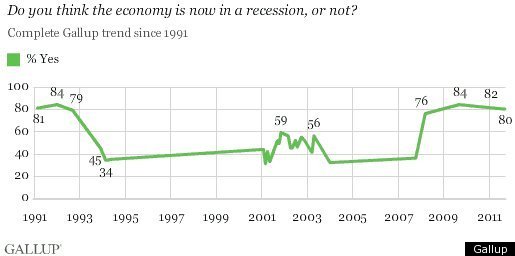A shortage of jobs and falling incomes have left an overwhelming share of Americans convinced that the Great Recession is not over, according to a Gallup Poll released Wednesday.
Eight in 10 Americans believe that the nation's economy is not growing and that the recession is an ongoing problem, the poll found. Nearly 75 percent of those polled also described the nation's economy as virtually unchanged since last year.

The grim sentiments captured in the Gallup Poll were recorded more than two years after The National Bureau of Economic Research -- the government’s official monitor of business cycles -- pronounced that the Great Recession had reached its official end. The poll reflects a level of post-recession pessimism unseen in the United States since the early 1990s.
Eight in 10 Americans believe that the nation's economy is not growing and that the recession is an ongoing problem, the poll found. Nearly 75 percent of those polled also described the nation's economy as virtually unchanged since last year.

The grim sentiments captured in the Gallup Poll were recorded more than two years after The National Bureau of Economic Research -- the government’s official monitor of business cycles -- pronounced that the Great Recession had reached its official end. The poll reflects a level of post-recession pessimism unseen in the United States since the early 1990s.
“The issue is jobs, jobs jobs,” said Kathy Bostjancic, the director of macro economic analysis for the Conference Board, a nonprofit New York-based research agency that gathers data about a variety of economic indicators. “Well, jobs and income.”
The Conference Board measures consumer confidence on a 100-point scale. In August, consumer confidence dropped to 44.5 from 59.2 in July, marking the lowest level of consumer confidence the agency has ever recorded outside of an official recession.
The major driver of consumer confidence is the state of the labor market, Bostijancic said. When unemployment is low, people are more likely to spend -- an indicator of optimism and an essential driver of economic growth.
In August, the nation’s economy didn't generate any new jobs, leaving 14 million people unemployed. Then, early this month, fresh census data revealed that the median household income dropped to $49,445 in 2010 from $50,599 in 2009.
“Americans are clearly feeling pain in their own families as well as seeing pain among their friends and neighbors,” said Karlyn Bowman, a senior fellow who specializes in public opinion research at The American Enterprise Institute, a conservative Washington, D.C.-based think tank. “And in what I would call a particularly un-American turn, there are few people who believe that things are going to get better. We Americans tend to always hold on to hope.”
American pessimism about the economy stems from the absence of jobs and a growing belief that there is a limit to what the government can do to create them or shape the economy, Bowman said.
While economic analysts may differ about the reasons for the public’s poor economic outlook, there has been no shortage of grim economic news from financial forecasters this week.
On Wednesday, economists with UBS, a global financial services company based in Switzerland, declared that the United States stands a one-in-three chance of falling back into a recession. Growth in both the United States and European economies has been tepid, the bank’s economists said. Debt levels and other important fiscal matters also remain unresolved in Europe.
And on Tuesday, the International Monetary Fund downgraded its expectations for the American economy and nearly 17 European counties. The U.S. economy will expand just 1.5 percent in 2011 and 1.8 percent next year, the IMF said. Both numbers represent a downgrade from the IMF's June economic forecast when U.S. economic growth was expected to reach 2.5 percent this year and nearly 3 percent in 2012.
The Gallup Poll results are based on telephone interviews conducted between Sept. 15 and 18 with a random sample of just over 1,000 adults living in the United States. The poll has a 4 percent margin of error.
No comments:
Post a Comment